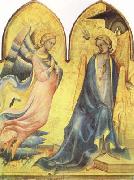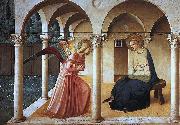
Oil On
Canvas, Real Flavor of Old Masters
|
Lorenzo Monaco
|
|||
|
|
|||
| Italian c1370-c1424 Lorenzo Monaco Gallery was a Florentine painter. He joined the Camaldolese monastery of Santa Maria degli Angeli in Florence in 1391, but he left monastic life before making a lifetime commitment. Despite this fact, he has traditionally been called "Lawrence the Monk." His work shows the influence of the International Gothic style of the late fourteenth century, as well as that of the Sienese school. | |||
|
|
|||
|
|
The Annunciation (mk08) new6/Lorenzo Monaco-733969.jpg Painting ID:: 21178 Visit European Gallery |
c.1410-1415 Tempera on wood 130x230cm Florence Galleria dell'Accademia | |
Height Width |
INS/CM |
||
|
X |
|
||
|
|
|||
|
Fra Angelico
|
|||
|
|
|||
| Fra Angelico Galleries b.c. 1400, Vicchio, Florence d.Feb. 18, 1455, Rome Fra Angelico (c. 1395 ?C February 18, 1455), born Guido di Pietro, was an Early Italian Renaissance painter, referred to in Vasari's Lives of the Artists as having "a rare and perfect talent". Known in Italy as il Beato Angelico, he was known to his contemporaries as Fra Giovanni da Fiesole (Brother John from Fiesole). In Giorgio Vasari's Lives of the Artists, written prior to 1555, he was already known as Fra Giovanni Angelico (Brother Giovanni the Angelic One). Within his lifetime or shortly thereafter he was also called Il Beato (the Blessed), in reference to his skills in painting religious subjects. In 1982 Pope John Paul II conferred beatification, thereby making this title official. Fiesole is sometimes misinterpreted as being part of his formal name, but it was merely the name of the town where he took his vows, used by contemporaries to separate him from other Fra Giovannis. He is listed in the Roman Martyrology as Beatus Ioannes Faesulanus, cognomento Angelicus??"Blessed Giovanni of Fiesole, nicknamed Angelico". Fra Angelico was working at a time when the style of painting was in a state of change. This process of change had begun a hundred years previous with the works of Giotto and several of his contemporaries, notably Giusto de' Menabuoi, both of whom had created their major works in Padua, although Giotto was trained in Florence by the great Gothic artist, Cimabue, and painted a fresco cycle of St Francis in the Bardi Chapel in Santa Croce. Giotto had many enthusiastic followers, who imitated his style in fresco, some of them, notably the Lorenzetti, achieving great success. | |||
|
|
|||
|
|
The Annunciation (mk08) new6/Fra Angelico-938997.jpg Painting ID:: 21184 Visit European Gallery |
Fresco 216x321cm Florence,Convent of San Marco | |
Height Width |
INS/CM |
||
|
X |
|
||
|
|
|||








